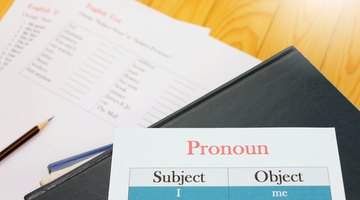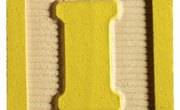To make a complete sentence, there must be a subject and a verb. A verb is a physical, mental or abstract action, and a subject is a noun, a person, place or thing, and any words that describe it. When it serves as the subject of a passage, the same noun is often used repeatedly. To eliminate this repetitiveness, a pronoun can be inserted to replace that noun, while still making sense grammatically. This allows for more variation in word choice. However, writers must be careful to use the correct pronoun.
Case
Case refers to the way that a pronoun functions in a sentence, whether nominative, objective or possessive. Nouns can be both subjects and objects, so a pronoun must be able to take the form of either. In the phrase "she is a singer," “she” serves as the subject functioning in the nominative case. In the phrase "the superhero carried her," the pronoun “her” is an object in the objective case. Pronouns can also be in the possessive case, such as "your" in the phrase "that is your house."
Gender
The pronoun antecedent is the noun that the pronoun is replacing. The antecedent can be a masculine, feminine or neutral word, and it determines which pronoun should be used. For example, if the sentence states that “Jenny went to the store,” knowing that Jenny is a female, you could also write that “she went to the store.” If the subject was Jerry instead, you could replace his name with “he.” Finally, if the noun is of neutral gender, meaning that it is not clear whether the subject is male or female, substitute a word like “it” or “its.” Instead of saying that “the dog went to the store,” you could say that “it went to the store.”
Number
Just like gender, the number property of a pronoun depends on the antecedent. Number refers to how many there are, so if there is only one, a singular pronoun should be used. In the same example as gender, you might say that “he,” “she” or “it” went to the store. If there is more than one, a plural pronoun will replace the noun. “They” went to the store.
Person
The property of person depends upon the point of view, or relationship between the speaker and the pronoun antecedent. First person personal pronouns, such as “I,” “me,” “mine,” “us” and “ours,” refer to the person, place or thing that is speaking. “I” went to the store. Second person pronouns, like “you,” “your” and “yours,” refer to the person who is being spoken to. Did “you” go to the store? Finally, third person, such as “he,” “she,” “it,” “they” and “them,” refers to who or what is being spoken about. “They” went to the store. “She” went to the store, too.
Related Articles
References
Writer Bio
Writing since 2008, Marisa Hefflefinger's work has appeared on websites such as SuperGreenMe, Jennifer McColm and Character Odyssey. She holds a Bachelor of Science in English education and a Master of Arts in teaching literacy and language, and she is currently working on a Ph.D. in critical literacy and English education.











